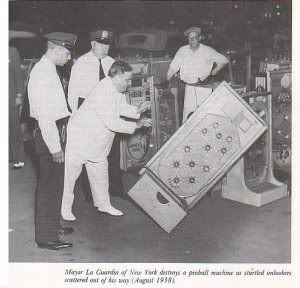 There are laws against games of chance in 39 states. These laws were used to outlaw pinball in New York City in the 1930's. The picture to the right is of New York's mayor Fiorello LaGuardia smashing a pinball machine. LaGuardia took a sledgehammer to several of these games of chance. This was highly publicized and was shown in newsreels in theaters around the country. Within 3 weeks, the NYPD had confiscated and destroyed more than 3,000 pinball machines. New York's ban on pinball wasn't lifted until 1976, when pinball was ruled to be a game of skill.
There are laws against games of chance in 39 states. These laws were used to outlaw pinball in New York City in the 1930's. The picture to the right is of New York's mayor Fiorello LaGuardia smashing a pinball machine. LaGuardia took a sledgehammer to several of these games of chance. This was highly publicized and was shown in newsreels in theaters around the country. Within 3 weeks, the NYPD had confiscated and destroyed more than 3,000 pinball machines. New York's ban on pinball wasn't lifted until 1976, when pinball was ruled to be a game of skill.Should games of chance be outlawed? Should a group of friends have to acquire a license to have a friendly informal poker game? The pinball ban was largely due to the crackdown on the crime waves of the 1930's, and much of the current stigma is still due to the connection of gambling to organized crime. Incorporating elements of chance in a game can prevent the game from becoming predictable and repetitive. However, games of pure chance take away the player's ability to increase their chances of success and aren't as fun as games of skill.
The poker case is headed back to court for an appeal.
References
Kent, S. L. (2001). The Ultimate History of Video Games. New York, New York: Three Rivers Press.
Mary Wisniewski. (2009). Texas Book'em. ABA Journal, 95(5), 16. Retrieved May 17, 2009, from Research Library Core database. (Document ID: 1706633531).
No comments:
Post a Comment